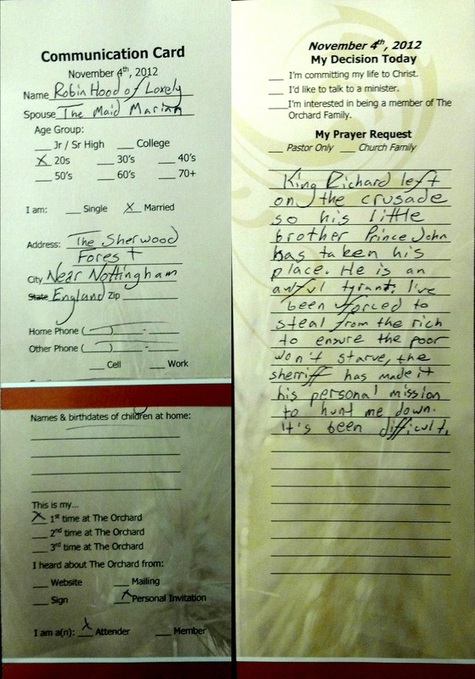
 Author extraordinaire David N. Alderman invited me to join in the discussion on edgy Christian speculative fiction, The Crossover Alliance, and some of the projects each of us are currently working on over at Gelatis Scoop GZONE. Check out the podcast, I had a great time discussing this sub-genre!
0 Comments
 Even Professor X doesn't know everything! Your pastor is not omniscient and he has no clue what your needs are. I’ve been doing ministry for nearly thirteen years in dozens of churches in New York, a large church in Los Angeles and a small church in Northern Michigan. People put a plethora of expectations on their pastors and spiritual leaders. Some of these are appropriate. A few of them are not. This is one of the most common erroneous expectations put on pastors: The pastor should know my needs and he should fulfill them. The problem with this expectation is that your pastor is a mere mortal and can’t possibly anticipate what you need and when you need it unless you tell him. Now, I know this sounds obvious and rational, but if I’m being really honest here, I must confess that I’ve held this expectation against a number of pastors I’ve been under. And even though this expectation sounds so unrealistic when put into words, I have never served at a church where this expectation was not present. From coast to coast I’ve often heard things like this: “I was in the hospital and the pastor never came.” “My kid got arrested and he never even called.” “My husband/wife left me and he never said a word.” “My relative died, we had a funeral, and he never reached out.” “I was in the pit of depression and he didn’t even care.” And I will, of course, first and foremost empathize and acknowledge their deep hurting. But I also have to ask, “Did he know about what happened? Did you ask him to come over or visit?” And most often, the answer is, ‘no’. This is called passive aggression and I’m very familiar with it because I have a tendency to be passive aggressive. Let me give you an example. A number of years ago, while living in L.A. and attending seminary full-time while simultaneously serving as a youth pastor I came home and found my wife on the computer doing something I thought was frivolous. I didn’t say anything though, and my frustration and anger grew as I stomped around our 450 square foot apartment. Finally, after about an hour of this, my wife asked, “why are you so angry?” And I blew up, “I have a major report due tomorrow, I have two hours to type it up and you’re doing research on curtain patterns!” (Or whatever it was.) And she looked at me, closed her work and said, “You never said anything. If you had asked I would have given you the computer.” And of course I responded with something I once heard on The Fresh Prince of Bel-Air, “I shouldn’t have to ask, you should just know.” I know, I know . . . it was ridiculous and obnoxious of me. It was passive aggressive and a terrible way to relate to anyone, and yet many of us do this to our parents, spouses, significant others, co-workers and in particular our pastors. And it’s wrong. But still, we get angry when the pastor doesn’t call, doesn’t visit, and doesn’t know. Pastors aren’t God. They’re not omniscient. We try to be, though. Personally, I try to anticipate the needs of my congregation, but the reality is if a person needs to talk or needs a visit, I need to know. I feel bad when I didn’t know that someone was in the hospital, arrested, or that a family member passed a few weeks ago. I really do. But I can’t do anything if I don’t know. I’m not God. Speaking of God, though, expecting the pastor to know and fulfill unspoken needs goes beyond what God is willing to do! God is omniscient (all-knowing). He’s also omnipotent (all-powerful). He is aware of all our struggles, hurts and pains. And yet, God himself, does not comfort us in our desperation or give us what we need unless we ask him! Consider James’ words: “You do not have because you do not ask” (James 4:2b HCSB). Or look at what Paul tells us to do with our worries, anxieties and difficulties: “Don’t worry about anything, but in everything, through prayer and petition with thanksgiving, let your requests be made known to God. And the peace of God, which surpasses every thought, will guard your hearts and minds in Christ Jesus” (Philippians 4:6-7 HCSB). Yes, God knows your situation, but he puts such a high price on having a relationship with us, that he withholds his comfort, answers and blessings until we come to him and ask. So, I suspect that my little blog post won’t transform all churches for all times. People will still passive aggressively expect their pastors to do things that even God won’t do. But, please, if you’ve stumbled across this little blog, don’t expect your pastor to know what your needs are. Your pastor loves you. He cares for you. He wants to meet your needs... but he needs to know what those needs are. Note: This blog post has not arisen from any recent occurrence or event. It actually arose from a recent sermon in a series through the book of Philippians.  This past summer I entered the Gideon Comic contest and won second place. The bloke who beat me is a gentleman by the name of Luis Serrano and I couldn’t have lost to a better artist. We’ve been corresponding a bit and he was kind enough to send me a free copy of his comic Samson the Nazirite. In this first issue we find Samson towards the end of his days on earth recounting his story to an Egyptian scribe. This issue focuses mostly on Samson’s miraculous birth through his adolescence. The layout is very professional and the artwork is amazing! The writing is tight and serves the story well. It is told mostly in flashbacks, which is a technique I’m not personally fond of, but it works here. Only “Issue #1” is available and Serrano is hosting a Kickstarter Project to raise funds to complete the graphic novel. Personally, I want to see this project happen so I’m tossing in a few bucks in hopes of raising funds. Please go check out his pages and consider donating. Rating: 4/5 (I really liked it) Samson the Nazirite Kickstarter Page Luis Serrano - Creator & Writer Tiffany Serrano - Writer Nadir Balan - Penciler & Art Director Mostafa Moussa - Inker Liezl Buenaventura - Colorist Jaymes Reed - Letterer  This past summer I entered a comic writing contest and came in second place. The “Strangers and Aliens” podcast interviewed me as a part of the prize package. Ben Avery from the show conducted the interviewed this past Monday and I had a great time! It also helps that I’m a big fan of Ben’s work . . . especially Tempest, Kingdoms, Hand of the Morning Star and Lullaby. You can download the episode here. (My interview segment begins just after the 38 minute mark). One of my favorite shows is the long-running, low-budget comedy Mystery Science Theater 3000. In a nutshell, a couple of mad scientists marooned a guy in space and force him to watch bad movies with the hopes that this experiment will somehow enable them to take over the world. In the early days of the show the “mads” often present their latest “evil” inventions to their captives. One of these experiments in particular, “A Hard Pill to Swallow” always struck me as a little harsh for the tone of the show. Take a watch: I, of course, thought it was hilarious. When I first saw this episode I was a teenager who was deathly ill and had to take a veritable mountian of pills three times a day. I learned how to swallow a bunch of pills in one gulp, and to date my record is 28 pills in one swallow! So I understand the idiom “That’s a hard pill to swallow.” It speaks to the difficulty of some situations. But fear not, whenever you have a “hard pill to swallow” there’s another idiom that will strength your bones, cause you to man-up (or woman-up), suck it up, and soldier on through the situation! Christians often say “God will never give you more than you can handle.” See?! So if you’re out of money, your spouse has gone missing, your kids have disowned you and your parents just jacked your car . . . just remember that little idiom, suck it up, and um . . . keep living. Feel better? I didn’t think so. That saying is wrong, anti-biblical, unhelpful, hurtful, harmful and accursed. It basically is communicating, “if you find yourself in a tough situation, God obviously knows you can handle it, so try your hardest to make it through and stop your whining.” Yeah. That sounds like something in the Bible. In fact, I remember this one story where Moses was leading the Israelites out of slavery in Egypt, but the Pharaoh decided to hunt him and his people down and slaughter them. As Pharaoh’s army forced the Israelites against the mighty Red Sea, God spoke to Moses and said, “I will never give you more than you can handle.” And so, filled with encouragement, Moses turned to the Israelite men, women, children and infants and shouted, “SWIM!” What’s that? You don’t remember the story happening that way? Yeah, that’s because it didn’t. What really happened? God put the Israelites in an impossible situation! How did they respond? Well, first they freaked out: “as Pharaoh approached, the Israelites looked up and saw the Egyptians coming after them. Then the Israelites were terrified” but then they, “cried out to the Lord for help” (Exodus 14:10 HCSB). You see, the message of the Bible is not one of self-sufficiency (like the idiom “God will never give you more than you can handle” implies). Instead, the message of the Bible is one of God-dependancy! The world is too big, and life is too complicated to go it alone. I think God doesn’t just give us “difficult pills to swallow,” he gives us impossible pills to swallow! (Like the Terry-gerbil pill!) I think God glories in giving us more than we can handle so that we will cry out to him like the Israelites in Egypt and say “help me God, I can’t do this on my own!” Here’s what happened when the apostle Paul asked the Lord to remove the mysterious (and impossible) “thorn” in his flesh: But He said to me, “My grace is sufficient for you, for power is perfected in weakness.” Therefore, I will most gladly boast all the more about my weaknesses, so that Christ’s power may reside in me. So I take pleasure in weaknesses, insults, catastrophes, persecutions, and in pressures, because of Christ. For when I am weak, then I am strong (2 Corinthians 12:9-10 HCSB). I think God always gives us more than we can handle so that we can rely on his strength, his power and see him do things far beyond our own abilities. A few days ago the Google Play store featured Peggy Lee's song "Fever" as a free download. As I was listening to it and singing along, I thought, this is a really sexy song . . . why am I thinking about the Muppets? And then I remembered! Thanks for bringing me up awesome, dad!
 After a year of hype and political theater it is perfectly normal for those who voted for Obama to feel jubilation, and for those who voted for Romney to feel deflated. I had once posted the following comments on a blog that is no longer live, back before the 2008 election: "A brief quote from John MacArthur was posted over at Jollyblogger concerning the elections. When asked if he was concerned where the next elected president would take this country MacArthus replied: 'I’m not concerned about that for 5 seconds. It has nothing to do with the kingdom of God — absolutely nothing to do with it. The Lord will build his Church; I’m concerned about his Church. I’m concerned about the name of Christ, the gospel, the glory of God, the purity of the Church, the clarity of the teaching of the word of God. Jesus said it as clearly as it could be said when he said to Pilate, ‘My kingdom is not of this world. If my kingdom were of this world, my servants would fight.’ His kingdom has nothing to do with this world. You could argue that the Roman power was oppressive, and even deadly, as indicated in Luke 13 when Pilate’s men went in and sliced up the Jews who were worshiping in the Temple. You can make the case that Jesus should have done something to obliterate slavery, or overturn Roman oppression, and free the people of Israel. It has nothing to do with that — ‘My kingdom has nothing to do with that. My kingdom is not of this world.’ Obviously, as a human being, I would like to see someone who is moral; I’d like to see someone who is a Christian have an opportunity to influence things from a viewpoint of Christianity. But this has nothing whatsoever to do with the advance of the kingdom of God. I am much more concerned about the kingdom that is not of this world than the kingdom that is America.' Now, obviously we need to vote (if we can) and pray for God’s will to be done. And I truly believe that God is in control over all things . . . . . . but tomorrow morning, if your propositions did not get passed, or your guys didn’t get into office I pray that we will all still be able to glorify our Father, knowing that He is in control still." I would add to these thoughts that regardless of who you voted for, believers are call to pray for President Obama (1 Timothy 2:1-4 ), and after the effects of the political theater have worn off in a day or two believers need to be more concerned about what they are going to do, more than what the president may or may not do.
My hope is not in politics. Legislation has no power to transform people or culture. At the end of the day I, and every Christ-follower, are called to build relationships with our neighbors, co-workers, family members and enemies and tell them that the God of the universe made them in His own image, and that he sent his son Jesus to die so they can have a right relationship with Himself. If I’m going to put my hope in anything, it’s the life-transforming power of Jesus’ resurrection and in the power of the Holy Spirit to change individuals and culture. Neither Mitt Romney, nor Barack Obama as president would ever possess a power and authority that comes close to the life-changing gospel. At the risk of stimulating a slew of copy-cat incidents of "communication card abuse" I have decided to post this one because it made me laugh.  The text reads: King Richard left on the crusade so his little brother Prince John has taken his place. He is a tyrant: I've been forced to steal from the rich to ensure the poor won't starve. The sherriff has made it his personal mission to hunt me down. It's been difficult. Having just finished preaching through the book of Philippians, I wanted to share a brief review of some of the commentaries I consulted throughout the series.  1. The NIV Application Commentary: Philippians by Frank Thielman This series of commentaries is rather unique because it will interact with each natural unit of scripture (as they see it), on three different levels. First, it looks at the historical context or “Original Meaning”. Second, it begins to bridge the context between the original text and our modern context, and finally it interacts with the contemporary significance of the text. In theory, this is a reasonable way to approach the text, but in this volume I found that oftentimes the “application” had moved so far away from the original meaning that I found these section virtually useless. In the first section, for instance, Thielman’s application involves instructing that believers and churches need to be making more Christian art (writing, painting, theater, film, etc.). That was a far cry from Paul’s original purpose. (Listen to my sermon here.) I found the “Original Meaning” sections to be very useful however and this book can function well as a help while reading the original text. Rating: 3/5 (I liked it)  2. Holman New Testament Commentary: Galatians, Ephesians, Philippians & Colossians by Max Anders I like this simple little commentary quite a bit. In fact, it’s almost a good alternative to the endless number of study Bibles that are being cranked out every year. (This is the topic of another blog, but in short, I would prefer if people would read the biblical text, reflect on it, move towards understanding it, and then turn to “study notes” and commentaries. But when the notes are right next to the text it is virtually impossible to do this preferred process.) The notes are simple and linked to specific verses, and the author tries to summarize the sections’ main ideas into a sentence or two. These sentences are technically imprecise at times, using a variety of conjunctions to lengthen the meaning, but they are very helpful. I have two main frustrations with this commentary, though. The first is that it treats the individual chapters as natural units of the text, and unfortunately, using the chapters to break up the sections is very unnatural and often results in cutting into some of Paul’s ideas. The second is the inclusion of some sort of teaching or preaching outline throughout this commentary. It is not very useful because I don’t preach the way the commentary wants me to preach, and couple that with the unnatural division of the book into chapters, and there’s an unfocused presentation of the material. Rating: 3/5 (I liked it)  3. The New International Commentary on the New Testament: Paul’s Letter to the Philippians by Gordon Fee I don’t have too many complaints here. Gordon Fee is amazing. He rightly highlights the work of the Holy Spirit, which is often missed by others. He divides the sections in a reasonable way, and structures his comments in a logically cohesive manner. My only caution here is that this is a technical commentary and Fee dives into issues of language, grammar, textual criticism and sentence structure that might bog down the lay person. This is the commentary an individual may want to get if, and only if, he or she really wants to dig deep into this book. Rating: 5/5 (I loved it)  Perspectives on Tithing is an engaging journey on the various views on Christian giving in light of the New Testament. Croteau (post-tithing) and Eklund/Hemphill (joyful tithing) make the best arguments for their views. Reggie Kidd's argument is, unfortunately, largely incoherent and the main idea of his view is difficult to ascertain. Gary North (tithe no more or less than 10% of net income) presents his view very well, but does not spend much time arguing his case from Scripture insomuch as makes assertions. The book also contains a helpful summary of the history of theologians' views on tithing throughout the history of the church, which demonstrates that there really has never been a unified view. Perspectives on Tithing is helpful, not so much in creating convictions, but in getting the theological mind thinking in the right direction. Rating: 4/5 Stars (I really liked it) |
Categories
All
Blog Roll
Breakpoint Archives
November 2023
|

 RSS Feed
RSS Feed
